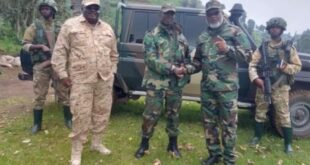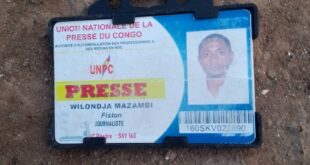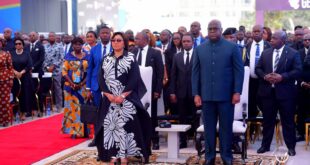The Rwandan and internationally renowned singer, Kizito Mihigo, died on February 17th, 2020 in police custody in Kigali – Rwanda. He had been kidnapped then imprisoned back in 2014. He was released in September 2018 following a presidential pardon, however, he remained under restricted freedom until his death. He couldn’t travel outside the country; periodically, he had also to report to the authorities.
“Igisobanuro cy’urupfu” or (translation: the explanation of death), a song he produced just before the genocide against the Tutsi commemoration month of April 2014, had been the cause of his serious enmity with the Kagame’s regime.
The song contradicts the official narrative denying any involvement of the Rwandan Patriotic Front, the political party and past rebel forces, of the present Rwandan president. It implicitly points to the RPF’s killing of the hutu population before during and after the 94 genocide against the tutsis.
Kizito Mihigo was re-arrested on February 13th, 2020 because of an alleged attempt to flee the country. Four days later, the Rwandan Investigation Bureau (RIB) announced that he had committed suicide and died. However, the general public and many international NGOs advocating for human rights are seeking an independent investigation into the causes of his death. They all suspect and still think that he was a victim of a political assassination orchestrated by RPF’s leadership, the motive being that he unwearyingly preached, wherever he went, true reconciliation among Rwandans.
During his first time in prison, this was from April 2014 to September 2018, he managed to reach out to individuals and organisations that were advocating for his release. Among them was Rene Mugenzi, coordinator of the Global Campaign for Rwandans’ Human Rights (GCRHR). He got in touch with him, and they started exchanging information about his life in prison and all the details of how he got there.
They agreed that it would be important to record his testimony and safeguard it for future use in the case something unpredictable happened to him.
The following text is an initial transcript of parts of the recordings he sent out to his contact at the time:
FIRST RECORDING
“This note was recorded on October, 6th, 2016. I am Kizito Mihigo. I am detained in the central prison of Kigali, officially called Nyarugenge prison, and alternatively called 1930, in reference to the year it was built. In April 2014, after having composed and produced a christian song, I was kidnapped, detained and accused of plotting and conspiring against the regime and its president.
In fact, on March 5th, 2014 I had made public a new song titled “igisobanuro cy’urupfu”, (translation: explanation of death). And I published it on my youtube channel, on my personal website, and the official pages of my foundation. During the following days, I received insults, harassment and warning messages telling me that something bad was going to happen to me. I was also contacted several times by government officials, including the minister of culture, (Protais Mitali) the chief of the criminal investigation department -CID (Theos Badege), the officer responsible for culture in the ministry of defense, (Lt. Col. Gerald Nyirimanzi), the executive director of the National Commission Against the Genocide (CNLG) – Jean de Dieu Mucyo and and official from the office of the president ( Ines Mpambara).
During his speech at the occasion of commissioning of police officers with new ranks on March 17th, 2014, the president had declared this: “I am not a singer to please the country’s enemies.” In the evening of April 1st, 2014, I was invited by the Chief of staff in the president’s office, ( Ines Mpambara ). The meeting took place in the office of the President of the senate. the current Senate President (Bernard Makuza), the time was Vice President of the same institution. Both told me that the president had not liked my song. Therefore, I had to apologise in writing to him. I had also to apologise to the population, which allegedly had been shocked by my song. At that meeting I tried to explain unsuccessfully that my song hadn’t been composed with the intention of harming anyone. It was rather a christian message which preached compassion, forgiveness and reconciliation to its audience.
The President’s chief of staff and the senate’s vice president told me that if I didn’t comply with what they were asking me to do, I was going to be killed.
Therefore I did what they had asked me, meaning apologizing to the president through a letter and the population through the media. The president’s chief of staff had reassured me that if I did what was asked from me, I wouldn’t have any more problems or face any other (translator emphasis – punitive) measures.
But on April 06, 2014, between 10:00am and 11:00am, when, with my driver I arrived in front of the traffic lights located on the road between the Parliament building and the Rwanda Development Board (RDB) headquarters, a person entered spontaneously into my car through an unlocked door. It was a policeman I knew. He ordered me to get out of my car and enter his. I went into his car. It was driven by another policeman that I also knew. They confiscated my phone, they told me that we were going to meet one of their superiors who wanted to talk to me. We didn’t go where they had mentioned, but instead we drove around the city of Kigali for tens of minutes. At the end I was taken to the police centre of Gikondo, generally known as “kwa Gacinya” or Gacinya’s place.
I stayed there for nearly 30 minutes, in a conference room without anyone asking me anything. And when I tried to ask questions, nobody responded to me. I was thereafter put back into the car, then we drove towards Kicukiro. Before arriving at the destination, two individuals in civilian uniforms joined us. They sat one on my left and the other on my right. The vehicle continued towards Nyanza forest. The area is located in the city suburb in the direction leading to Bugesera.
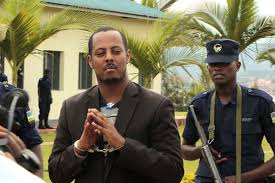
I remained in the car parked in that forest, and surrounded by people I didn’t know and who were not talking to me. From midday until late evening around 8:00pm. Around 6:00pm, I told myself these people were going to kill me in that forest. My body would be discovered the following day, on April 07, the day of comemorating the 94 genocide. Then I said (to my kidnappers) that if the problem was my song, I had discussed the issue with the president’s chief of staff and the senate’s vice president. Within a few minutes, the car left the forest and I was again driven to the office of the Senate’s Vice President. I met with the same officials as before, but there was a third one this time, the Deputy Police Commissioner (Dan Munyuza)
They told me that, on top of the song, for which I was accused, they had found in my phone a whatsapp discussion where I exchanged views with someone from the opposition. And it was true. I had a conversation with someone from the opposition, and in our exchange we were critical of the government. I knew that the Rwandan government didn’t like to be criticised, although to me I feel it’s not a crime to criticise government.
During that second meeting in the office of the senate’s Vice President, I was seriously insulted by the three present personalities, and I was threatened of being killed. I said sorry. I was then told that I needed to continue asking for forgiveness, but that this time they were not sure if I was going to be forgiven. I was then taken to the car. Once inside, I had my head and face covered with a black balaclava. The vehicle was running but I couldn’t know where we were going. Within minutes, I found myself in a room with a bed, in a residential house, and I stayed there for nine days.
I was handcuffed 24/7. I ate once every two days. On this very day while I am saying this, I can’t tell where that house/ prison is located. Because each time I was taken out or coming in, my head and face were always covered. I got seriously questioned in that house on several occasions. On April 10th 2014 for example, meaning four days after the kidnapping, I was taken to the office of the Deputy Police Commissioner, Dan Munyuza, I was beaten up by policemen who were there, I was made to lie on the ground and I was canned. Thereafter I was taken to a room at the offices of the Prime Minister. I found there many VIPs from the government. They asked me as well many questions about my song and my whatsapp conversation with a member of the opposition.
Up until April 15th, I stayed locked up in the same secret safe house. It was the same day that I was brought in front of the media. The Deputy Police Commissioner came to me and said that if I continued asking for forgiveness publicly and pleading guilty for all the accusations against me, for the period of investigation and hearing in front of the court, things would be easier for me. On the other hand, if I pleaded not guilty and started denouncing all the injustices I had been victim of, I was going to be sentenced for life imprisonment. And I was certainly going to die in prison. He continued insisting on me pleading guilty on that day, before I appeared in front of the journalists. He explained that pleading guilty and asking for forgiveness, that’s how things will get easier for you, but if you start challenging the authority, pleading not guilty or denouncing your kidnapping or torture and other illegal practices inflicted unto you, you will get life imprisonment.
I agreed on the terms of the arrangement. To the media and the judge, I said that I was sorry for my deeds, but I couldn’t help saying that I only discussed my song with someone. During my hearing, nothing related to the song was mentioned, but I know well that it was central to the whole saga. It was on the day of its launch that I had been arrested, even if they hadn’t traced that conversation (with someone in the opposition), they would’ve caused me problems. That had already occurred uniquely because of that song.

On April 15th, after addressing the press, I was taken to the public attorney without a lawyer. The public attorney gave me one day to find myself a lawyer. During my hearing, I always pleaded guilty as I had promised. And on February, 27th 2015, I was sentenced to 10 years of imprisonment. I was told that I was guilty of all the accusations against me, except being complicit in acts of terrorism. Within 30 days after the sentencing, I introduced an appeal to the High Court and I am still waiting (on October 6th, 2016) to hear from them.
SECOND RECORDING
This note is recorded on February 8th, 2017 at the Central prison of Kigali, called 1930. I am Kizito Mihigo, detained since April 2014. Recently, on January 21st 2017 to be specific, I received the visit of the General Police Commissioner, Emmanuel Gasana, who came alone and talked with me in the office of the prison’s director. He explained to me that the motive of his visit was to ask me if I didn’t have any message to transmit to the highest authority of the country. I told him that the only message for him was to ask for forgiveness and be allowed to get back into society and become active again, pursue my music career.
He asked me a few questions about my case. He asked me among other things why I had dared to discuss with a member of the opposition, which is the main official offence for my imprisonment. I replied that I was frustrated. I disagreed with some government policies and actions. And that on a personal level I had also had opposing views with some political personalities. He asked me if there wasn’t any other way of solving issues which didn’t involve discussing with the opposition. I replied that I hadn’t anymore trust in the government, and that I needed someone who could understand me. He asked me if I wanted the president to forgive me or a presidential pardon. I said yes. I wanted to be forgiven, but that I wanted to be allowed to pursue my music career and christian work, which promotes peace and reconciliation. I explained to him that by advocating for peace and reconciliation as an artist, I would be contributing to the work of the government for national reconciliation. After around ten minutes of conversation, the police commissioner left without saying goodbye. The same way as he had come in and didn’t greet me. I didn’t know exactly the motive of his visit, neither who had sent him.
In conclusion, in my view, my case is political, with fabricated evidence. For example, I didn’t know the individuals who were brought to testify against me. I only knew Cassien Ntamuhanga who was a journalist. I find that there wasn’t any connection between our cases. But the prosecution needed those false witnesses to prove that I was guilty. One example of making up evidence against me is that the witness called Jean Paul indicated to the judge in the courtroom that the police had tortured and forced him to accept a guilty plea which would make Kizito guilty by association. It was a political case, without any respect for proper legal procedures. It was characterised by many illegal practices, including torture, kidnapping, unauthorised detention. The arrest procedure was also illegal. Normally, when someone is arrested, they are told the motive of the arrest and shown a legal document authorising it. This wasn’t the case in my situation.”
The list of the people in high positions of authority in Rwanda, from government officials, to security officers and civilians, who tortured Kizito Mihigo directly and or indirectly by giving orders, includes the following names. The list is not comprehensive.
Paul Kagame, Protais Mitali, Gerard Nyirimanzi, Ines Mpambara, Bernard Makuza, Athanase Ruganintwali, Aphrodis Mutangana, Dan Munyuza, Jean de Dieu Mucyo, James Kabarebe, Karenzi Karake, Jack Nziza, Fred Ibingira, Eugene Rurayi Gasana, Jean Pierre Dusingizemungu, Egide Gatera, Denis Basabose, Theos Badege, Emmanuel Hitayezu Egide Gatera, Jean Pierre Dusingizemungu….etc.
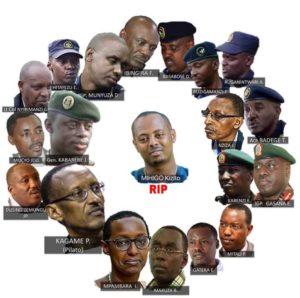
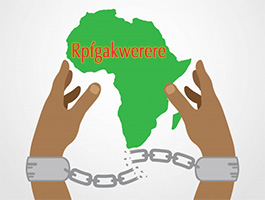 Africa Just another WordPress site
Africa Just another WordPress site
